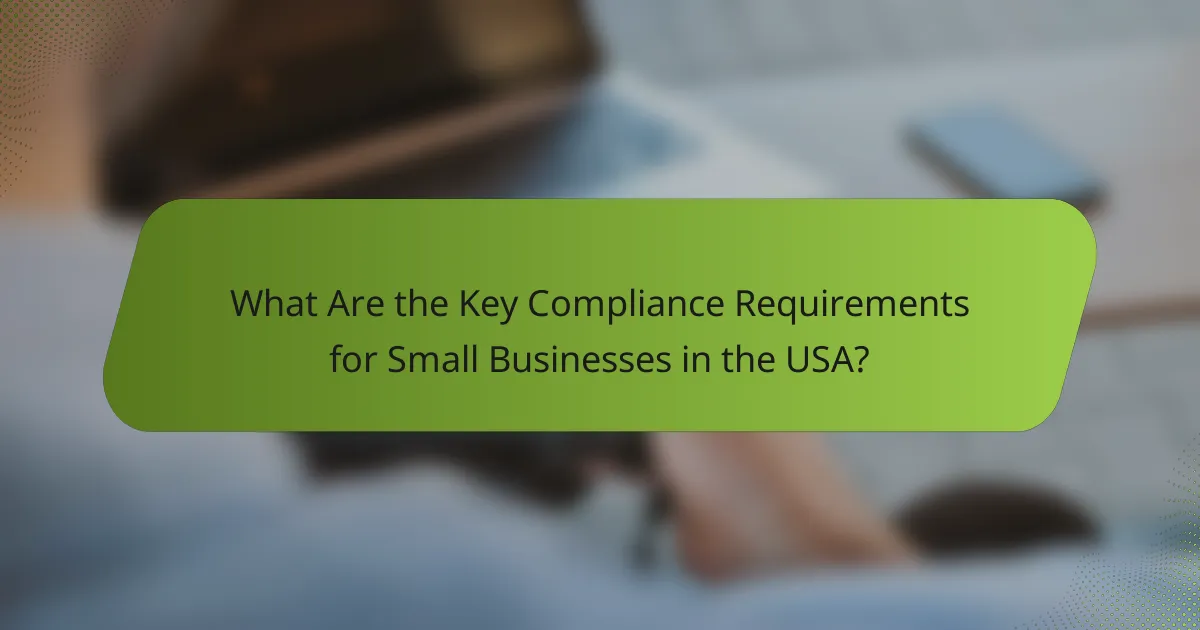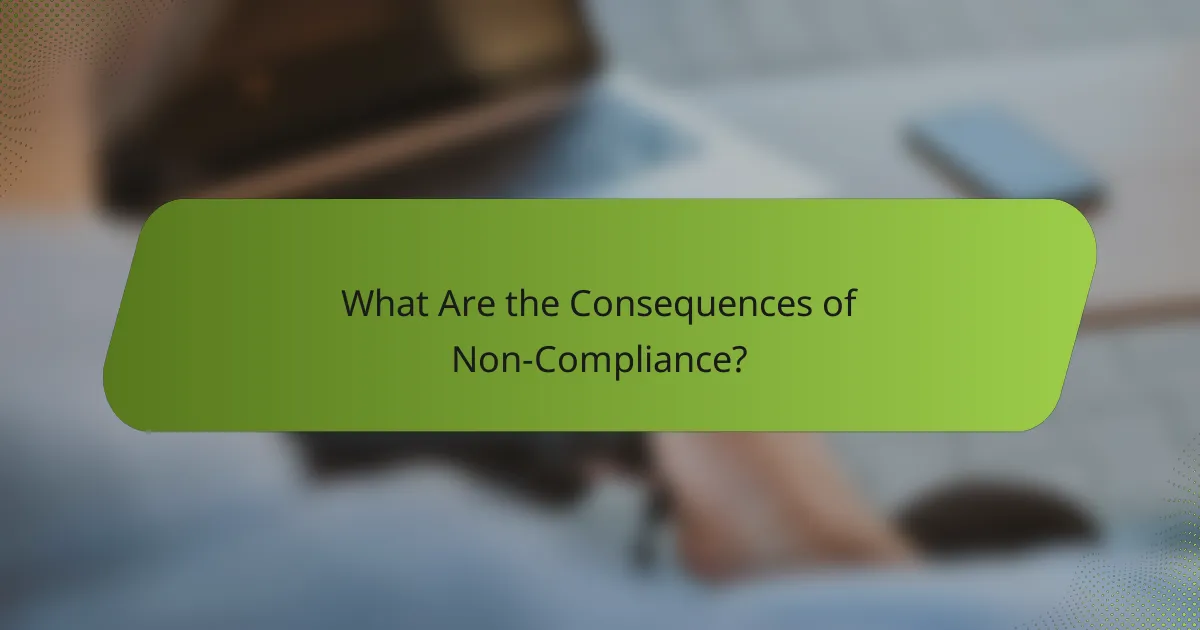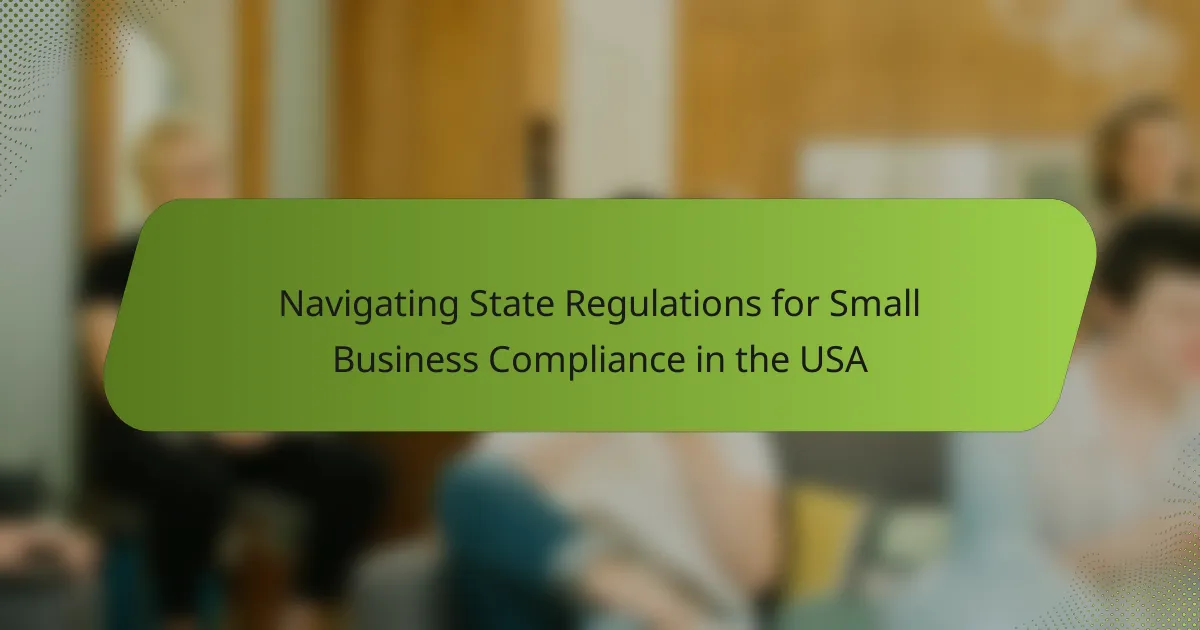Navigating state regulations is essential for small businesses in the USA to ensure compliance and avoid legal pitfalls. Each state has unique requirements that can vary widely based on the type of business and its location. By understanding these regulations and implementing systematic compliance measures, small business owners can foster smooth operations and mitigate risks.

What Are the Key Compliance Requirements for Small Businesses in the USA?
Small businesses in the USA must adhere to various compliance requirements that include federal, state, local, and industry-specific regulations. Understanding these requirements is crucial for avoiding legal issues and ensuring smooth operations.
Federal regulations
Federal regulations set the baseline for compliance across the country. Key areas include labor laws, tax obligations, and environmental regulations enforced by agencies like the Occupational Safety and Health Administration (OSHA) and the Environmental Protection Agency (EPA).
Small businesses should familiarize themselves with the Fair Labor Standards Act (FLSA), which governs minimum wage and overtime pay, as well as the Internal Revenue Service (IRS) guidelines for tax reporting. Non-compliance can result in significant penalties.
State-specific regulations
Each state has its own set of regulations that can vary widely. These may include additional labor laws, tax requirements, and business registration processes. For instance, some states require businesses to obtain specific licenses or permits that are not mandated at the federal level.
It is essential for small business owners to consult their state’s business regulatory agency to understand the specific compliance requirements applicable to their operations. Regular updates to state laws mean staying informed is crucial.
Local ordinances
Local ordinances can impose additional compliance requirements that affect small businesses directly. These may include zoning laws, health and safety codes, and local tax regulations. For example, a restaurant may need to comply with local health department regulations regarding food safety.
Business owners should check with their city or county government to ensure they meet local compliance standards. Ignoring local regulations can lead to fines or even closure of the business.
Industry-specific standards
Many industries have specific standards that businesses must follow. These standards can be set by professional organizations or regulatory bodies and often cover areas like product safety, quality control, and ethical practices.
For example, businesses in the healthcare sector must comply with the Health Insurance Portability and Accountability Act (HIPAA), which governs patient data privacy. Understanding and adhering to these industry standards is vital for maintaining credibility and avoiding legal repercussions.
Licensing and permits
Obtaining the necessary licenses and permits is a critical step for compliance. Depending on the business type and location, this may include general business licenses, health permits, and specific industry-related licenses.
Small business owners should create a checklist of required licenses and permits based on their industry and locality. Failing to secure the proper documentation can lead to fines and operational disruptions. Regularly reviewing licensing requirements can help ensure ongoing compliance.

How to Identify Applicable State Regulations?
Identifying applicable state regulations is crucial for small business compliance. Start by understanding your business type and location, as regulations can vary significantly across states and industries.
Research state government websites
State government websites are primary resources for finding regulations relevant to your business. Each state typically has a dedicated section for business resources that outlines licensing requirements, tax obligations, and industry-specific regulations.
To effectively navigate these sites, look for sections labeled “Business” or “Entrepreneurs.” Bookmark important pages and check them regularly for updates, as regulations can change frequently.
Consult legal experts
Engaging with legal experts can provide tailored advice on state regulations that apply to your business. Attorneys specializing in business law can help interpret complex regulations and ensure compliance.
Consider scheduling consultations with local business attorneys or firms that have experience in your industry. This investment can save you from costly fines and legal issues down the line.
Use compliance software tools
Compliance software tools can streamline the process of tracking and managing state regulations. These tools often provide updates on regulatory changes and help maintain records of compliance activities.
When selecting software, look for features that cater to your specific industry and state requirements. Many tools offer trial periods, allowing you to assess their effectiveness before committing financially.

What Are the Steps for Ensuring Compliance?
Ensuring compliance involves a systematic approach to meet state regulations for small businesses. Key steps include conducting audits, implementing training, and maintaining thorough documentation.
Conduct a compliance audit
A compliance audit is a critical first step in identifying areas where your business may not meet state regulations. This process involves reviewing your operations, policies, and procedures against applicable laws and standards.
Consider using a checklist that covers key compliance areas such as labor laws, tax obligations, and environmental regulations. Regular audits, ideally on an annual basis, can help you stay ahead of potential issues.
Implement compliance training
Compliance training is essential for ensuring that all employees understand their responsibilities regarding state regulations. Tailor training programs to address specific compliance issues relevant to your business and industry.
Training should be conducted regularly, with updates provided whenever regulations change. Utilize a mix of in-person sessions and online courses to accommodate different learning styles and schedules.
Maintain proper documentation
Proper documentation is vital for demonstrating compliance with state regulations. Keep organized records of all relevant policies, training sessions, and audit results to provide evidence of your compliance efforts.
Consider using digital tools for document management to streamline access and ensure that records are easily retrievable. Regularly review and update your documentation to reflect any changes in regulations or business practices.

How to Stay Updated on Regulatory Changes?
To stay updated on regulatory changes, small business owners should actively seek out reliable information sources and engage with their industry. Regularly checking for updates can help ensure compliance and avoid potential penalties.
Subscribe to regulatory newsletters
Subscribing to regulatory newsletters is an effective way to receive timely updates directly from government agencies and industry experts. Many state and federal agencies offer newsletters that summarize recent changes and upcoming regulations.
Consider signing up for newsletters from the Small Business Administration (SBA) or your local Chamber of Commerce. These resources often provide tailored information relevant to your specific business sector.
Join industry associations
Joining industry associations can provide valuable insights into regulatory changes affecting your business. These organizations often have dedicated resources to keep members informed about compliance requirements and legislative updates.
Membership can also offer networking opportunities with other business owners who share similar challenges. This can lead to shared strategies for navigating regulations effectively.
Attend compliance workshops
Attending compliance workshops is a proactive way to learn about regulatory changes and best practices. These workshops often feature experts who can provide in-depth information and answer specific questions related to your business.
Look for workshops hosted by local business development centers or industry associations. Participating in these events can enhance your understanding and help you implement necessary changes in your operations.

What Are the Consequences of Non-Compliance?
Non-compliance with state regulations can lead to severe penalties for small businesses, including fines, legal action, and even the loss of business licenses. Understanding these consequences is crucial for maintaining operational integrity and avoiding costly disruptions.
Financial Penalties
Financial penalties for non-compliance can vary significantly depending on the regulation and state. Fines may range from hundreds to thousands of dollars, impacting a business’s bottom line. For example, failing to adhere to labor laws could result in fines that accumulate quickly, especially if violations are repeated.
Legal Ramifications
Non-compliance can expose a small business to legal actions, including lawsuits from employees or customers. Legal fees can add up rapidly, diverting resources from business growth. Moreover, a court ruling against a business can lead to additional costs, such as settlements or mandated changes in operations.
Reputational Damage
Failure to comply with regulations can harm a business’s reputation, leading to a loss of customer trust and loyalty. Negative publicity can deter potential customers and partners, which may have long-term effects on sales and growth. Maintaining compliance is essential for building a positive brand image.
Operational Disruptions
Non-compliance can result in operational disruptions, such as the suspension of business licenses or permits. This can halt operations entirely, leading to lost revenue and increased overhead costs. Small businesses should regularly review compliance requirements to avoid these interruptions.
Increased Scrutiny
Once a business has been flagged for non-compliance, it may face increased scrutiny from regulatory bodies. This can lead to more frequent inspections and audits, consuming valuable time and resources. Proactively addressing compliance can help mitigate this risk and foster a smoother operational environment.
